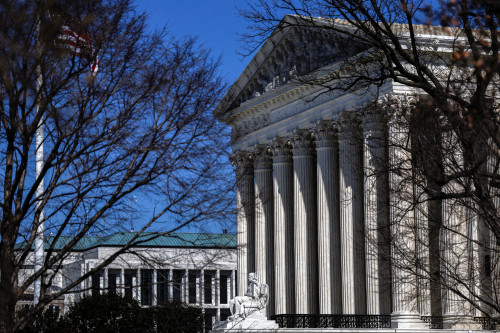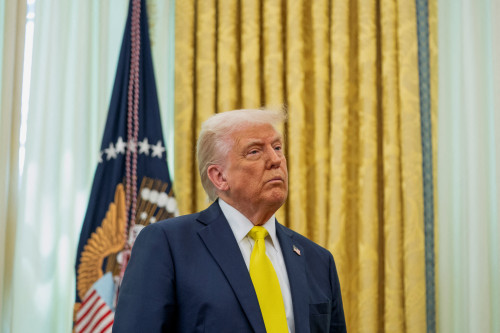By Andrew Chung
WASHINGTON (Reuters) – President Donald Trump’s administration was prepared to carry out deportations of dozens of Venezuelan migrants detained in Texas under a 1798 law historically used only during wartime without judicial review and contrary to the U.S. Supreme Court’s prior orders, lawyers told the justices Monday.
American Civil Liberties Union attorneys representing the migrants urged the Supreme Court in a written filing to maintain its block on the deportations to a prison in El Salvador. The ACLU filing said that administration officials had not provided the migrants the required notice or opportunity to contest the removals before many were loaded on buses headed to the airport.
The filing is the latest development in a high-profile legal battle involving the Republican president’s immigration crackdown that has raised questions about his administration’s willingness to comply with limits set by the top U.S. judicial body.
“Whatever due process may require in this context, it does not allow removing a person to a possible life sentence without trial, in a prison known for torture and other abuse, a mere 24 hours after providing an English-only notice form (not provided to any attorney) that gives no information about the person’s right to seek judicial review, much less the process or timeline for doing so,” the ACLU’s filing stated.
The U.S. government has accused the migrants of being members of Tren de Aragua, a criminal gang originating in Venezuelan prisons that he Trump administration has designated as a foreign terrorist group. Trump has invoked the 1798 Alien Enemies Act in a bid to swiftly deport them.
The law authorizes the president to deport, detain or place restrictions on individuals whose primary allegiance is to a foreign power and who might pose a national security risk in wartime.
The nine-member Supreme Court early on Saturday temporarily barred the administration from deporting the migrants, acting swiftly in a case in which the lawyers for the migrants had warned of imminent removals. Two conservative justices, Samuel Alito and Clarence Thomas, publicly dissented from that decision.
ACLU lawyers filed urgent requests on Friday in multiple courts, including the Supreme Court, after reporting that migrants held at the Bluebonnet immigration detention facility were at imminent risk of removal.
The Supreme Court on April 7 placed limits on how deportations under the Alien Enemies Act may occur even as the legality of that law’s use for this purpose is being contested. The justices required that detainees receive notice “within a reasonable time and in such a manner” to challenge the legality of their removal.
Trump’s Justice Department told the justices that the bid by the migrants for relief was premature because “they improperly skipped over the lower courts before asking this one for relief.”
In a written filing, U.S. Solicitor General D. John Sauer said detainees are receiving advance notice of their removals and have had adequate time to file claims for judicial review.
ACLU lawyers pushed back on this assertion, saying that a lower court judge had not acted despite evidence that the migrants were being readied for imminent removal and “would almost certainly have been removed” had the Supreme Court not intervened.
The migrants were loaded on to buses that left the Bluebonnet facility, only later to be turned around “presumably because of applicants’ filing” to the Supreme Court, the lawyers said.
The administration has already deported to a maximum-security prison in El Salvador more than 200 Venezuelan and Salvadoran men it claims are gang members.
In Monday’s filing, the ACLU lawyers said that as the justices weigh whether to maintain the temporary block on deportations should also clarify that the administration’s actions are contrary to the April 7 ruling, and provide guidance to the measures required to provide the migrants’ adequate notice.
Transferring “large numbers of individuals it intends to remove under the AEA (Alien Enemies Act) between judicial districts and providing English-only AEA notices less than 24 hours before removal and without any explanation as to how the individual may seek judicial review – cannot by any stretch be said to comply with this court’s order that notice must be sufficient to permit individuals actually to seek habeas review,” the filing said.
The lawyers also suggested the court take up and hear arguments in the case to resolve “whether the AEA can be invoked outside of wartime against a criminal organization and for only the fourth time in U.S. history.”
(Reporting by Andrew Chung in Washington; Editing by Amy Stevens and Will Dunham)









